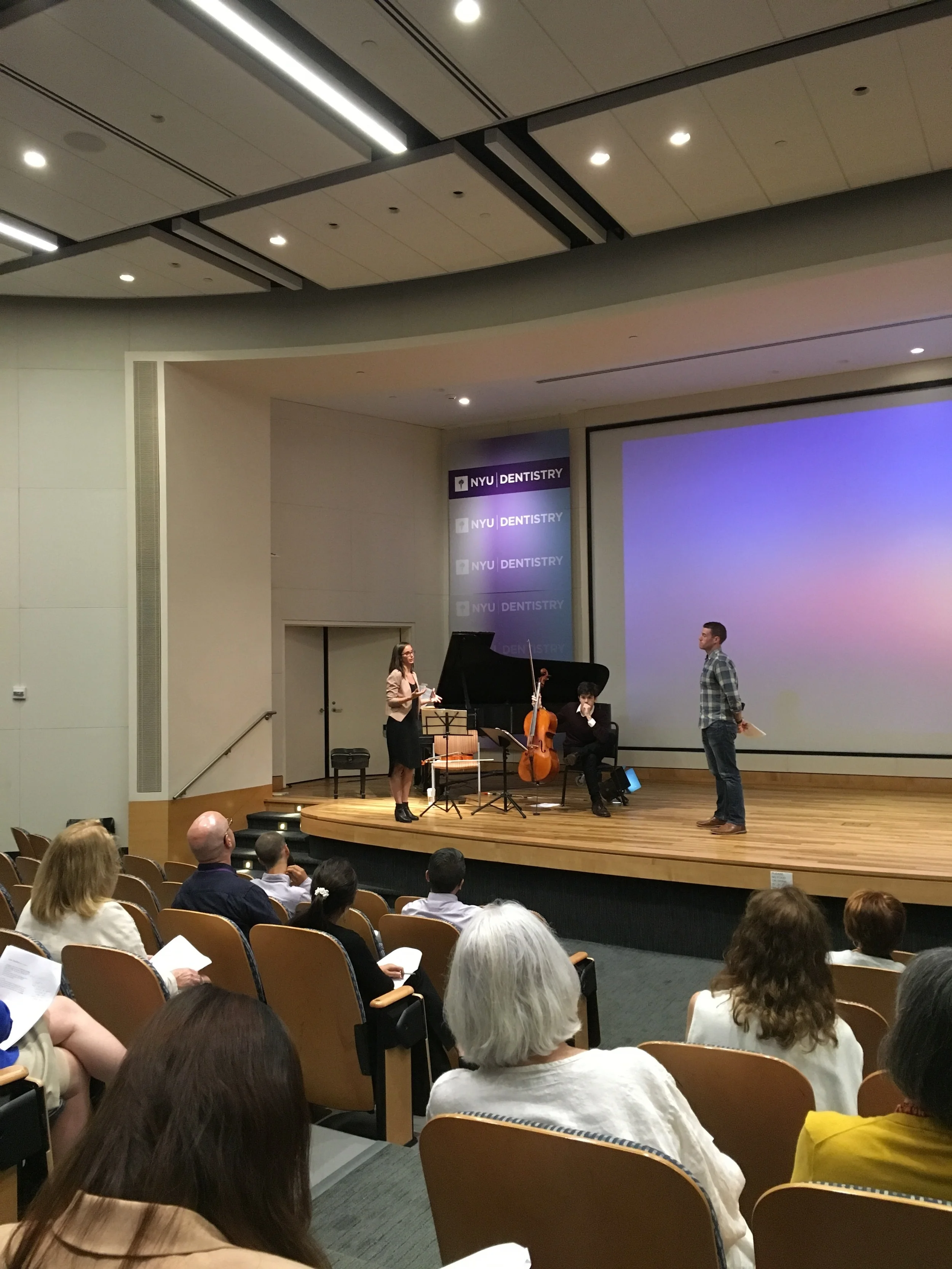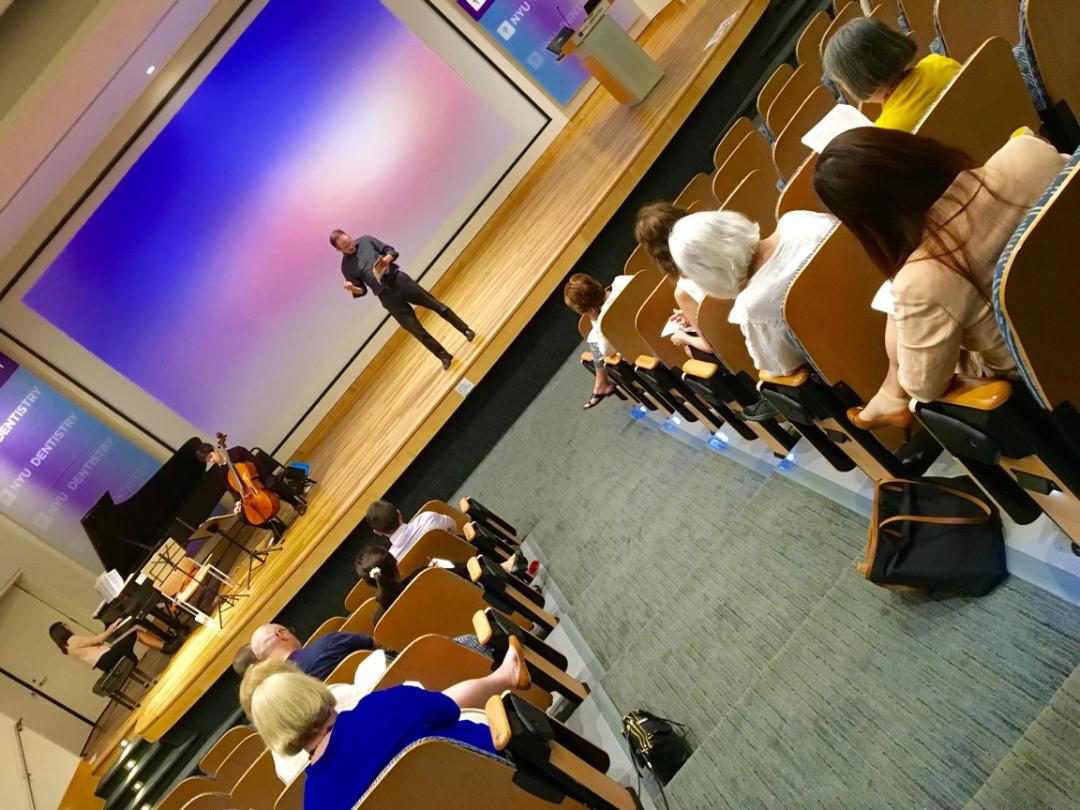Written by: Cleo Person
Dancer | Choreographer
Arts Fusion Initiative’s first professional development workshop with faculty members of NYU’s school of nursing - June 2nd, 2016
We recently facilitated a professional development workshop of sorts for faculty at the NYU School of Nursing as an exploration into our inkling that the artistic work we do might be a source of transferable values that can reach beyond people in the performing arts; our shared idealism had led us to believe that art can be the seed of possibility for deepening connections within the often isolated human experience. We approached our workshop with the nursing faculty not with any concrete set of objectives to teach, but instead with a curiosity about whether by welcoming non-arts people into our method of collaborative artistic creation, we might be able to create a space for others to experience the same vulnerability, and therefore authenticity and connection with our own humanity, that we strive to find in our work every day.
We were slightly trepidatious because this was our first major experiment of this kind, but the six hours we spent at NYU seemed, by all accounts, to be a transformational launch with a profound impact on everyone in the room.
We based the workshop structure on our own multi-disciplinary collaborative process. To create our concert works of music, dance, and theater elements, we seed our creation process with a central text, which for us has always been a poem, and which gives us a shared world to dive into together. To find a way in, we create a space for ourselves to find and discuss individual interpretations fueled by our distinct life experiences and aesthetic perspectives. We engage in a layering method, whereby we begin to chose music selections and create choreography reflective of our own individual takes on the text, and ultimately work to weave these diverse viewpoints into a cohesive concert experience representative of all our our perspectives.
“I became overwhelmed by the wisdom that began to pour from these people, many of whom it became clear had lived full and intense lives...”
As we moved into one large group, encouraging volunteer readers to step up as we paid sensitive attention to their vocal inflections and the new meaning it created, we felt the group had become cohesive enough to invite them to join us in the process of layering in music and movement choices. The rest of the workshop flowed forth as an improvisation in intuitive choice making. We had not predetermined any time frames for how long to spend with each text before moving on, or how many possibilities of sound and staging could emerge in the experiment. As such, we moved forward in much the same way as we drive our own lives forward- armed with knowledge we’ve gained, yet committed to the inspiration of the moment, and open to the inherent risk of an unknown, not preordained future. In this meaty part of the workshop, our own engagement with the moment’s inspiration as workshop leaders required a level of openness to learning and readiness for outcomes that couldn’t have been predetermined, and in doing so, seemed to fully level the field between workshop leaders and participants.
As we continued on, I was struck more and more vigorously by the bravery and rawness the participants allowed to come over and out of themselves. I became overwhelmed by the wisdom that began to pour from these people, many of whom it became clear had lived full and intense lives, just by the inflections that creeped into their voices. It seemed as if rivers of experience which may have been dammed up to some extent for years suddenly rushed forth. By the end, as the whole group stood in a circle on stage (again, not a pre-planned activity, but something that seemed in the moment simply must occur,) together saying the last stanza of the poem, everyone unanimously put down the paper from which we had been reading. It seemed like the most momentous collective action, uniting us in a total way.
We requested feedback from our participants at the end of the session, and were floored by their responses. One man, who had had a sort of gruff way about him at the beginning of the day told everyone he felt as if “he had softened.” Another gentleman told us “he thought he hated poetry, until today, when he realized how many ways and approaches there could be into it.” He said that he had felt his spirit elevated by the inclusion of classical music and dance, and many voiced that they were grateful above all that our innovative workshop hadn’t been made up of a power point presentation. That, it appears, was the greatest value of the workshop: it happened in much the opposite way of a power point presentation- a medium which conveys information in only one direction, and has no ability to listen and accommodate the response that comes from its audience. The experience of the day instead had removed the boundary between teacher and student, demonstrator and participant almost entirely, and seemed to have power only because of the growth of a new organism that included all voices in the room.
“ ... I’ve fully come to believe that in places where the deepest necessary conversations are lacking or where it becomes too easy to fall into the regimented mindsets that govern our everyday lives, engaging with each other through our common language of the arts brings the possibility of transformative connection.”
The workshop seems truly like something that could be shared in countless varieties only as long as it continues to evolve with the individuals present, not something that could be reproduced as a mold and sold in the spirit of an industrialist product-based economy. After this experience, I’ve fully come to believe that in places where the deepest necessary conversations are lacking or where it becomes too easy to fall into the regimented mindsets that govern our everyday lives, engaging with each other through our common language of the arts brings the possibility of transformative connection. This space of connection, I believe, is where we find meaning in our lives.


